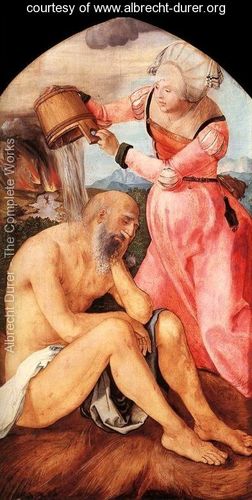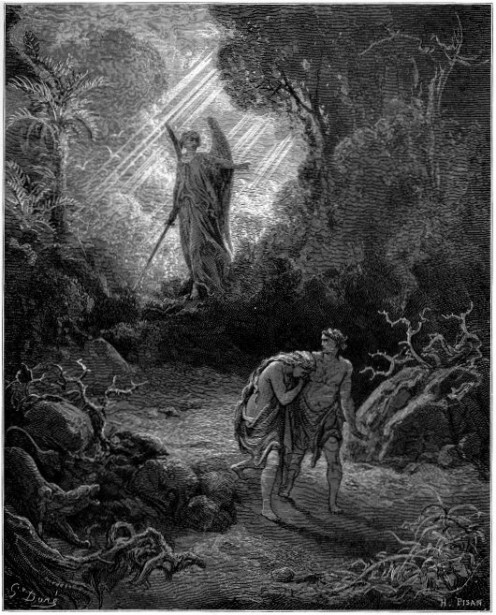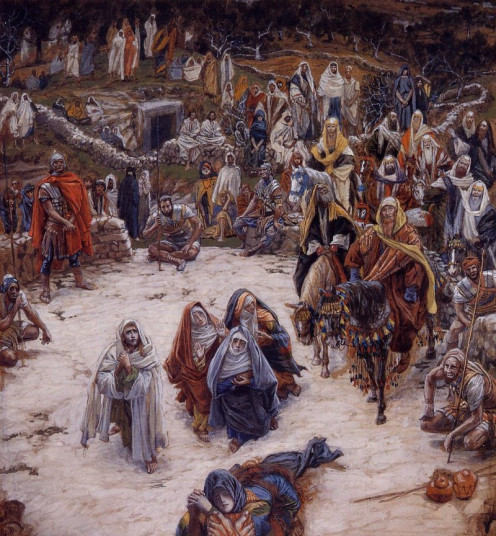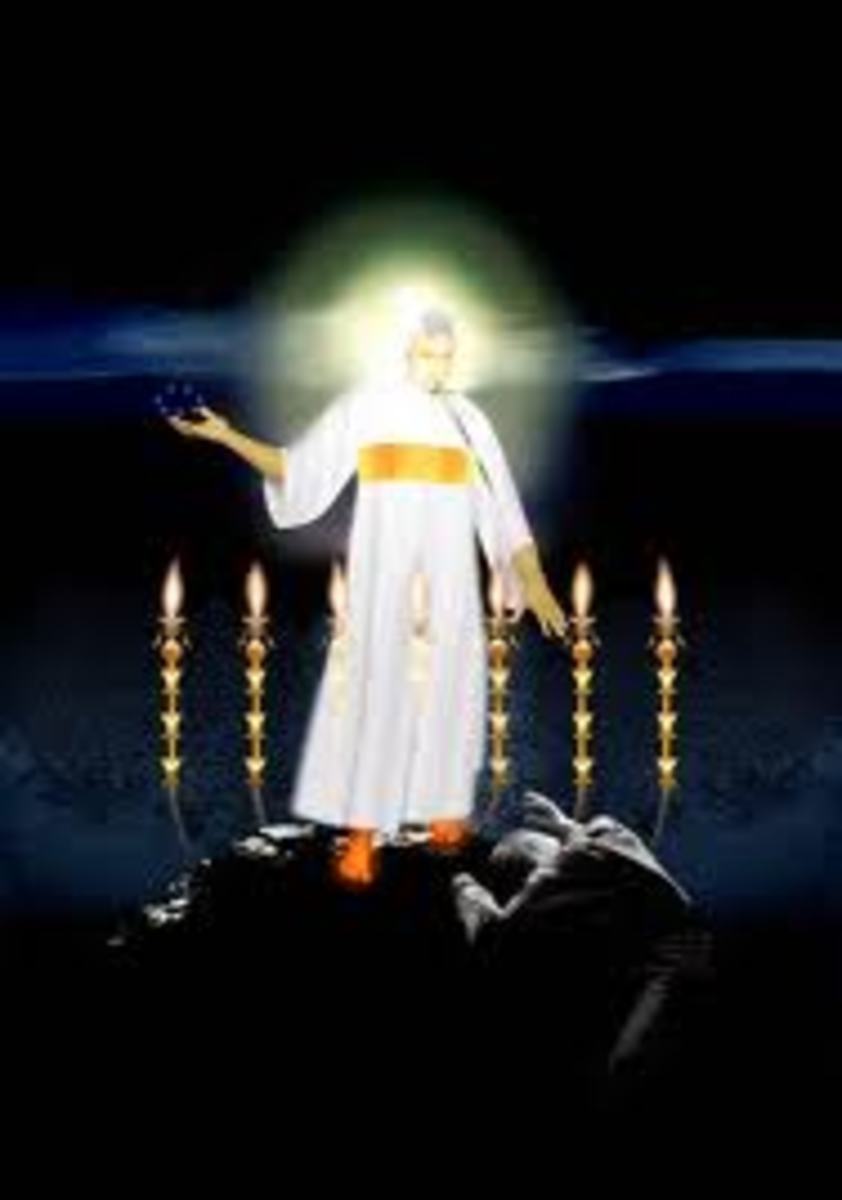The Denigration of Adam: Does It Really Matter?


Introduction
A clear perspective on the life and 'deaths' of Adam is pivotal to Christianity.
In my opinion, there are those with a hidden agenda behind the denigration of Adam. By diminishing the creation and fall of Adam, not only does it impugn the Scriptures, sin and the fallen nature of man are reduced to irrelevant issues.
Sadly, it is not only unbelievers who are dismissive of Adam, some Bible scholars also teach he never existed and the creation account in Genesis is simply an allegory. Others that a Pre-Adamic race existed prior to the creation of Adam, thereby, undermining God's great plan of redemption.
I will attempt to explain why I believe the Genesis account of Adam and Eve. I don't expect to change the minds of 'all' sceptics, but I do hope to inform and encourage fellow believers confronted by intransigent critics.
So how should Bible believing Christians respond? Our ensample is the Lord Jesus Christ, who constantly responded to His critics with the Word of God.
The Inspiration of the Scriptures
- 2Ti 3:16 KJV All scripture is given by inspiration of God, and is profitable for doctrine, for reproof, for correction, for instruction in righteousness:
If believers accept without question that Adam and Eve never existed, the implications have far reaching repercussions, in particular, the defamation of the Word of God.
Reputations are at risk, Job, Luke, Paul, James, Jude, and the Lord Jesus Christ, all affirmed the existence of Adam and Eve. If we undermine their testimony how can we rely on anything else they said or wrote.
Job on the Dunghill, with his Wife

Job's Reference to Adam
- Job 31:33 KJV If I covered my transgressions as Adam, by hiding mine iniquity in my bosom:
Job referred directly to Adam's transgression and his vain attempt to hide from God.
A Quote from Adam Clarke's Commentary on the Bible
Job 31:33 'If I covered my transgressions as Adam - Here is a most evident allusion to the fall. Adam transgressed the commandment of his Maker, and he endeavored to conceal it; first, by hiding himself among the trees of the garden: “I heard thy voice, and went and Hid myself;” secondly, by laying the blame on his wife: “The woman gave me, and I did eat;” and thirdly, by charging the whole directly on God himself: “The woman which Thou Gavest Me to be with me, She gave me of the tree, and I did eat.” And it is very likely that Job refers immediately to the Mosaic account in the Book of Genesis. The spirit of this saying is this: When I have departed at any time from the path of rectitude, I have been ready to acknowledge my error, and have not sought excuses or palliatives for my sin.'
Ezekiel's Reference to Job
- Eze 14:14 K JV Though these three men, Noah, Daniel, and Job, were in it, they should deliver but their own souls by their righteousness, saith the Lord GOD.
Some scholars also claim Job was a fictitious character, while Ezekiel revealed Job had a soul.
The Scriptures confirm Job's existence. On two occasions, Ezekiel included Job with Noah and Daniel, when he described them as three righteous men...Ezekiel 14:20.
James' Reference to Job
- Jas 5:10-11 Take, my brethren, the prophets, who have spoken in the name of the Lord, for an example of suffering affliction, and of patience. 11 Behold, we count them happy which endure. Ye have heard of the patience of Job, and have seen the end of the Lord; that the Lord is very pitiful, and of tender mercy.
Not only did James describe Job as a man of patience, he included him with other great men of God, 'the prophets'.
Luke's Reference to Adam
- Luk 3:38 KJV Which was the son of Enos, which was the son of Seth, which was the son of Adam, which was the son of God.
Luke traced the genealogy of Christ back to Adam. How did he do that if Adam never existed?
If we reject Luke's research, we are obliged to accept that Christ is also a fictional character! How could Jesus descend from someone who never was?
Adam and Eve

Paul's Reference to Adam
- 1Ti 2:13-14 KJV For Adam was first formed, then Eve. 14 And Adam was not deceived, but the woman being deceived was in the transgression.
It is interesting to note that none of the inspired writers suggested or alluded to an allegorical Adam.
Paul not only affirmed the existence of Adam, he revealed Adam was not deceived.
Adam knew exactly what he was doing when he ate the fruit, and was fully aware of the consequences.
According to some scholars, the serpent deceived Adam into believing he would be like God, which contradicts Paul’s account. The serpent beguiled Eve; she partook of the fruit and persuaded Adam to do the same.
- Gen 2:24 KJV Therefore shall a man leave his father and his mother, and shall cleave unto his wife: and they shall be one flesh.
Adam loved Eve and joined in her disobedience that she might not be alone in the death she had brought upon herself. They were one flesh.
A Quote from John Gill's Exposition of the Bible
1Timothy 2:14 'The apostle's positive assertion is to be taken without any such limitations or qualifications; Adam never was deceived at all; neither by the serpent, with whom he never conversed; nor by his wife, he knew what he did, when he took the fruit of her, and ate; he ate it not under any deception, or vain imagination, that they should not die, but should be as gods, knowing good and evil. He took and ate out of love to his wife, from a fond affection to her, to bear her company, and that she might not die alone; he knew what he did, and he knew what would be the consequence of it, the death of them both; and inasmuch as he sinned wilfully, and against light and knowledge, without any deception, his sin was the greater: and hereby death came in, and passed on all men, who sinned in him:'
The repercussions of Adam's sin were far reaching in that his posterity would also experience the same spiritual death.
Do you believe Adam existed?
Jude's Reference to Adam
- Jud 1:14 KJV And Enoch also, the seventh from Adam, prophesied of these, saying, Behold, the Lord cometh with ten thousands of his saints,
Jude wrote that Enoch was the seventh patriarch from Adam. Enoch may even have met Adam, since they were alive at the same time.
The Lord Jesus Christ Alluded to Adam and Eve
- Mat 19:3-4 KJV The Pharisees also came unto him, tempting him, and saying unto him, Is it lawful for a man to put away his wife for every cause? 4 And he answered and said unto them, Have ye not read, that he which made them at the beginning made them male and female,
- Mar 10:6 KJV But from the beginning of the creation God made them male and female.
The Pharisees tested Jesus by asking Him to explain His view on divorce. Jesus began His discourse by asserting that in the beginning of creation God made male and female, thereby, He alluded to Adam and Eve. Since Jesus attested to the existence of Adam and Eve, who are we to judge otherwise.
If we trust the Word of God, and are satisfied that Adam and Eve really existed, we can confidently find more answers.
Adam Chose Eve Rather Than the Lord
Adam forfeited all the blessings of the Garden of Eden through his disobedience. Why did he do that?
- Jud 1:6 KJV And the angels which kept not their first estate, but left their own habitation, he hath reserved in everlasting chains under darkness unto the judgment of the great day.
God imputed Adam with certain attributes, but immutability was not one of them, he was subject to change. Nevertheless, he did have freewill similar to the angels who had the ability to choose between loyalty and rebellion.
Personally, I do not believe mankind has freewill to the same degree as Adam prior to his fall. The only exception being freewill in secular matters, allthough marginalised and impaired by outside influence.
The capacity to assimilate the options available is essential to freewill. On understanding the alternatives, desire increases, only then choice becomes attainable.
- 1Co 2:13-14 KJV Which things also we speak, not in the words which man's wisdom teacheth, but which the Holy Ghost teacheth; comparing spiritual things with spiritual. 14 But the natural man receiveth not the things of the Spirit of God: for they are foolishness unto him: neither can he know them, because they are spiritually discerned.
Regarding spiritual matters 'man' does not have freewill, because 'man's' natural mind cannot grasp spiritual concepts. Natural 'man' is dead in trespasses and sin and consequently unable to discern spiritual matters, therefore desire and choice remain quiescent.
Adam could comprehend from experience a spiritual relationship with God his creator, and a loving relationship with his wife. His desire was realised when he rejected the Lord and chose Eve.

The Deaths of Adam
Adam lived, died, continued to live, and died at 930 years of age, how could that be? God said if he ate the fruit of the tree of the knowledge of good and evil, he would die that day.
- Gen 2:17 KJV But of the tree of the knowledge of good and evil, thou shalt not eat of it: for in the day that thou eatest thereof thou shalt surely die.
Some scholars claim that although Adam did not die physically that day, by applying the often misquoted ‘one day is with the Lord as a thousand years’...2 Peter 3:8, they deduce he began to die.
Adam was told categorically he would die that day. Who are we to challenge such a clear statement?
- Gen 3:4-5 KJV And the serpent said unto the woman, Ye shall not surely die: 5 For God doth know that in the day ye eat thereof, then your eyes shall be opened, and ye shall be as gods, knowing good and evil.
Satan told Eve she would not die. God said they would die. I believe God!
- Gen 3:6 KJV And the eyes of them both were opened, and they knew that they were naked; and they sewed fig leaves together, and made themselves aprons.
The day Adam ate the fruit he immediately received the knowledge of good and evil, it is therefore reasonable to conclude he also died that day.
- Gen 3:17 KJV And unto Adam he said, Because thou hast hearkened unto the voice of thy wife, and hast eaten of the tree, of which I commanded thee, saying, Thou shalt not eat of it: cursed is the ground for thy sake; in sorrow shalt thou eat of it all the days of thy life;
'in sorrow shalt thou eat of it all the days of thy life' It is obvious biological death was not the result of disobedience. God said Adam would die the day he ate, yet God told him his punishment for sin was the life of an outcast..
Adam and Eve died spiritually that day in accordance with God's Word. Jesus came to redeem man from spiritual death; physical death was never the issue.
- Eph 2:5-6 KJV Even when we were dead in sins, hath quickened us together with Christ, (by grace ye are saved;) 6 And hath raised us up together, and made us sit together in heavenly places in Christ Jesus:
It is important to understand that Adam's spirit did not die, spiritual death meant alienation from God. Adam was cast out through disobedience. Christ's death and resurrection was the way 'man' was restored to his creator. By being born again 'man' is resurrected to life with God.
The Result of Adam's Fall
During the Old Covenant Age, if someone was cast out from the Children of Israel that person was out of covenant and therefore considered dead.
- Luk 15:24 KJV For this my son was dead, and is alive again; he was lost, and is found. And they began to be merry.
The parable of the prodigal son is an illustration of a loving father and a disobedient son. While the son was in a far away country, he was dead to his father. When the son returned with humility and repentance his father forgave him and restored his privileged position; he had been 'resurrected' from the dead. The New Covenant introduced by the Lord Jesus Christ is also one of forgiveness, resurrection, reconciliation, and restoration.
'For as in Adam all die'
- Rom 5:12 KJV Wherefore, as by one man sin entered into the world and death by sin; and so death passed upon all men, for that all have sinned:
Paul alluded to Adam when he taught the sin of Adam had brought death upon mankind.
- 1Co 15:22 KJV For as in Adam all die, even so in Christ shall all be made alive.
Again, Paul affirmed the existence of Adam when he compared the consequences of Adam's sin to the redemptive work of Christ. All descendants 'in Adam' suffer spiritual death; all who are 'in Christ' enjoy spiritual resurrection.
1 Corinthians 15:22 'in Adam all — in union of nature with Adam, as representative head of mankind in their fall.
in Christ ... all — in union of nature with Christ, the representative head of mankind in their recovery. The life brought in by Christ is co-extensive with the death brought in by Adam.'
— Jamieson, Fausset and Brown CommentaryThe Tree of the Knowledge of Good and Evil
Some scholars teach that God never intended Adam to eat of the tree. Of course He did! By what other means would man know ‘good’ without knowing the difference between good and evil?
God created Adam with the ability to exercise freewill. Adam would not have learned the difference between good and evil without the opportunity to choose an alternative path, God used His adversary Satan to accomplish His great plan of redemption.
Unfortunately, Adam acquired knowledge in depth and was cast out of the Garden of Eden, he exchanged the blessings of the Kingdom of God for the evil taskmaster and the kingdom of darkness.
- 1Pe 1:19-20 KJV But with the precious blood of Christ, as of a lamb without blemish and without spot: 20 Who verily was foreordained before the foundation of the world, but was manifest in these last times for you,
God had no need of a 'plan B', He was not surprised by Adam’s disobedience. The Lord being omniscient, omnipotent, and omnipresent, knew the end from the beginning. He knew 'man' would fail the test; nevertheless, God had already prepared His great plan of Redemption before the foundation of the world.
A Quote from Albert Barnes' Notes on the Bible
1 Peter 1:20 'It follows from what is said in this verse:
(1) That the atonement was not an afterthought on the part of God. It entered into his plan when he made the world, and was revolved in his purposes from eternity.
(2) It was not a device to supply a defect in the system; that is, it was not adopted because the system did not work well, or because God had been disappointed. It was arranged before man was created, and when none but God could know whether he would stand or fall.
(3) The creation of the earth must have had some reference to this plan of redemption, and that plan must have been regarded as in itself so glorious, and so desirable, that it was deemed best to bring the world into existence that the plan might be developed, though it would involve the certainty that the race would fall, and that many would perish. It was, on the whole, more wise and benevolent that the race should be created with a certainty that they would apostatize, than it would be that the race should not he created, and the plan of salvation be unknown to distant worlds. See the notes at 1Pe 1:12.'
View from the Cross

God’s Great Plan of Redemption
- Joh 11:25-26 KJV Jesus said unto her, I am the resurrection, and the life: he that believeth in me, though he were dead, yet shall he live: And whosoever liveth and believeth in me shall never die. Believest thou this?
Physical death is not a prerequisite for resurrection. Believers, who were once spiritually dead, experience resurrection by grace through faith in Christ.
- Psa 116:15 Precious in the sight of the LORD is the death of his saints.
Should physical death hold fear over those in Covenant with God? Biological death does not separate the believer from God. Physical death is the way into the greater plan of God for those who have put their trust in Him.
Has this Hub challenged you to search the Scriptures?
Conclusion
Jesus is the antitype of the tree of life in the Garden of Eden.
I believe from a Christian perspective, the Scriptures provide the answers to the questions that plague the conscience of 'man'. Unfortunately, the natural mind cannot contemplate the spiritual things of God, and thereby reacts disparagingly to anything Christianity proffers. Only the Holy Spirit can enlighten the heart of 'man'.
If you are not born again, and this article has stirred interest in your heart, call on the Lord, and ask Him to reveal His plan of salvation, He will answer.
What do you think?
There Never Was a Pre-Adamic Race
- There Never Was a Pre-Adamic Race
The Gap Theory was a vain attempt to harmonise the Scriptures with Science. However, problems arose when scholars took Scriptures out of context in an attempt to prove their theory.
Alexander Gibb

© 2014 Alexander Gibb








